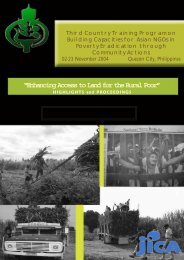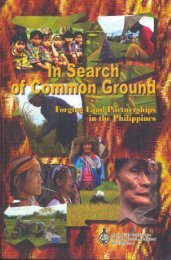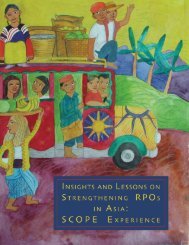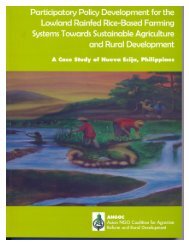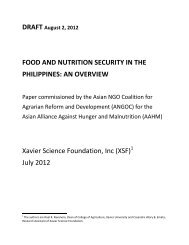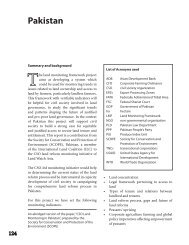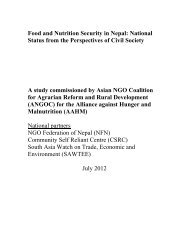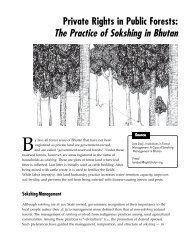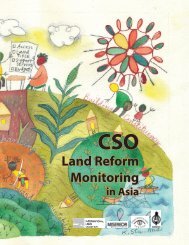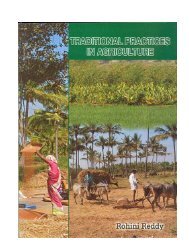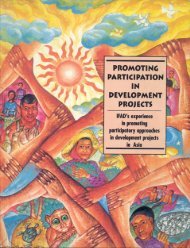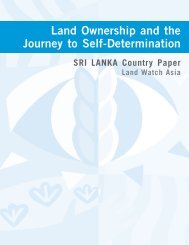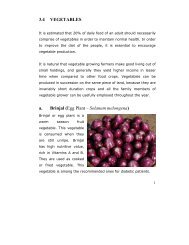Securing the Right to Land FULL - ANGOC
Securing the Right to Land FULL - ANGOC
Securing the Right to Land FULL - ANGOC
You also want an ePaper? Increase the reach of your titles
YUMPU automatically turns print PDFs into web optimized ePapers that Google loves.
Philippine land. These laws are still effective and enforced by<br />
various government agencies.<br />
1. Republic Act (R.A.) 6657 or <strong>the</strong> Comprehensive Agrarian<br />
Reform Law (CARL)<br />
Enacted in 1988 during <strong>the</strong> Aquino administration<br />
(1986–1992);<br />
Expanded <strong>the</strong> coverage of <strong>the</strong> agrarian reform program <strong>to</strong><br />
all agricultural lands regardless of crop planted;<br />
Targeted <strong>to</strong> redistribute around 8.1 million hectares of agricultural<br />
land and ISF areas <strong>to</strong> 3.9 million landless tenant<br />
farmers and farmworkers over a 10–year period (1988–<br />
1998); 5<br />
Provides for different tenurial instruments based on land<br />
classification: tenurial security for forestry areas, and tenancy<br />
reforms and land redistribution for private and alienable<br />
lands. <strong>Land</strong> redistribution is complemented by <strong>the</strong><br />
delivery of support services such as extension, credit, infrastructure<br />
facilities and assistance in livelihood projects;<br />
Imposes a five-hectare retention limit for <strong>the</strong> landowner<br />
and provides three hectares for each heir who is actually<br />
tilling <strong>the</strong> land;<br />
Exempts from distribution: ancestral lands inhabited by<br />
indigenous cultural communities; lands with a slope<br />
above 18 degrees; reserved lands like national parks, forest<br />
reserves, fish sanctuaries, and watersheds; lands for<br />
national defense and education and experimental farms,<br />
churches and mosques, cemeteries, etc.<br />
Managed by <strong>the</strong> Department of Agrarian Reform (DAR), while<br />
<strong>the</strong> DENR takes <strong>the</strong> lead role in providing tenurial security in<br />
forestlands, under <strong>the</strong> ISF program of <strong>the</strong> CARP;<br />
Operationalized by <strong>the</strong> DAR through two main program<br />
components: <strong>Land</strong> Tenure Improvement (LTI) and Program<br />
Beneficiaries Development (PBD). The main strategy for<br />
PBD is <strong>the</strong> establishment of agrarian reform communities<br />
(ARCs), through which assistance and integrated development<br />
will be undertaken.<br />
Beneficiaries of <strong>the</strong> CARP are categorized in<strong>to</strong> three<br />
groups based on <strong>the</strong>ir tenurial status: (i) owner/cultiva<strong>to</strong>rs;<br />
(ii) leaseholders who were granted permanent use<br />
rights over <strong>the</strong> land; and (iii) farm workers who render<br />
service for value as an employee or laborer in an agricultural<br />
enterprise or farm;<br />
Guarantees equal rights <strong>to</strong> land ownership and equal<br />
shares of <strong>the</strong> farm’s produce between women and men<br />
beneficiaries.<br />
DEFENDING THE GAINS OF TENURIAL REFORM<br />
Some Restrictions on <strong>Land</strong><br />
Ownership and <strong>Land</strong> Use<br />
135<br />
Section 2, Article XII declares that natural resources, o<strong>the</strong>r than<br />
agricultural lands, shall not be alienated; that <strong>the</strong> State shall have<br />
full control and supervision of any exploration, development, and utilization<br />
of natural resources; that <strong>the</strong>re are citizenship limits for <strong>the</strong><br />
exploration, development, utilization and ownership of natural resources;<br />
that any joint venture or partnership which <strong>the</strong> State enters in<strong>to</strong> should<br />
be with groups that are at least 60% Filipino-owned for not more than<br />
25 years and renewable for ano<strong>the</strong>r 25 years only.<br />
This restrictive policy applies with equal force <strong>to</strong> alienable lands 5 ,<br />
as stated in Section 3, which delineates <strong>the</strong> manner of alienation,<br />
<strong>the</strong> period of <strong>the</strong> lease, and <strong>the</strong> size of <strong>the</strong> land. Alienable lands of<br />
<strong>the</strong> public domain are limited <strong>to</strong> agricultural lands. Private corporations<br />
or associations may not hold such public lands except by lease,<br />
for a period not exceeding 25 years, renewable for not more than 25<br />
years, and not <strong>to</strong> exceed 1,000 hectares in area. Citizens of <strong>the</strong><br />
Philippines may lease not more than 500 hectares, or acquire not<br />
more than 12 hectares by purchase, homestead, or grant.<br />
The provision also cites conservation, ecology and development,<br />
and <strong>the</strong> requirements of agrarian reform as bases for Congress <strong>to</strong><br />
regulate <strong>the</strong> size of lands that may be alienated.<br />
The restrictions applicable <strong>to</strong> alienable lands likewise apply <strong>to</strong><br />
private lands since Section 7 of <strong>the</strong> article provides that no private<br />
lands shall be transferred or conveyed except <strong>to</strong> individuals, corporations,<br />
or associations qualified <strong>to</strong> acquire or hold lands of <strong>the</strong> public<br />
domain and through inheritance.<br />
2. R.A. 8371, or <strong>the</strong> Indigenous Peoples <strong>Right</strong>s Act of 1997<br />
(IPRA)<br />
Seeks <strong>to</strong> recognize, promote, and protect <strong>the</strong> rights of Indigenous<br />
Cultural Communities/ Indigenous Peoples (ICCs/IPs).<br />
These include <strong>the</strong> right <strong>to</strong> ancestral domain and lands, selfgovernance,<br />
and <strong>the</strong> right <strong>to</strong> cultural integrity.<br />
Recognizes <strong>the</strong> prior rights, including <strong>the</strong> pre-conquest<br />
rights of indigenous peoples, thus superseding o<strong>the</strong>r land<br />
and resource rights;<br />
Under <strong>the</strong> principle of self-determination, ICCs/IPs shall<br />
formulate <strong>the</strong>ir own ancestral domain sustainable development<br />
and protection plans (ADSDPs) based on <strong>the</strong>ir indigenous<br />
knowledge systems and practices. Contracts,<br />
licenses, concessions, leases and permits within <strong>the</strong> ancestral<br />
domains shall not be renewed or allowed without <strong>the</strong><br />
ASIAN NGO COALITION FOR AGRARIAN REFORM AND RURAL DEVELOPMENT



